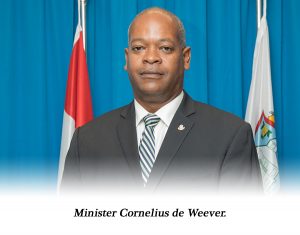Minister of Justice Message on International Day Against Drug Abuse and Illicit Trafficking
 POND ISLAND — Tuesday, June 26, 2018 marks International Day against Drug Abuse and Illicit Trafficking. The theme for 2018 is: ‘Listen First – Listening to children and youth is the first step to help them grow healthy and safe.’
POND ISLAND — Tuesday, June 26, 2018 marks International Day against Drug Abuse and Illicit Trafficking. The theme for 2018 is: ‘Listen First – Listening to children and youth is the first step to help them grow healthy and safe.’
Minister of Justice Cornelius de Weever says the ‘Listen First’ theme is an initiative to increase support for prevention of drug use that is based on science and is thus an effective investment in the well-being of children and youth, their families and their communities.
By resolution 42/112 of 7 December 1987, the General Assembly decided to observe 26 June as the International Day against Drug Abuse and Illicit Trafficking as an expression of its determination to strengthen action and cooperation to achieve the goal of an international society free of drug abuse.
The global observance aims to raise awareness of the major problem that illicit drugs represent to society
“Drugs continue to be a challenge around the globe on a daily basis. Large countries and small nation states such as ours, drug abuse does not discriminate. It has serious impacts on small communities impacting health and well-being.
“I appeal to parents as the school summer holiday is just about to begin, to use this vacation period to spend more time with your children and teenagers in building a strong and unbreakable listening relationship.
“Listening First, understanding what your child or teenager is saying will further develop communication between parent and child. Listen First is key to addressing any challenges that your child or teenager may have.
“Once this has been established, you both will be able to overcome any challenges that present themselves and work together to resolve them,” Minister of Justice Cornelius de Weever said on Monday.
The end of the first century of drug control (it all started in Shanghai in 1909) coincided with the closing of the United Nations (UN) UNGASS decade (launched in 1998 by a General Assembly Special Session on Drugs).
These anniversaries stimulated reflection on the effectiveness, and the limitations, of drug policy. The review resulted in the reaffirmation that illicit drugs continue to pose a health danger to humanity.
That’s why drugs are, and should remain, controlled. With this sanction in mind, Member States confirmed unequivocal support for the UN Conventions that have established the world drug control system.
The UN General Assembly recognized that despite continued and increased efforts by the international community, the world drug problem continues to constitute a serious threat to public health, the safety and well-being of humanity, in particular young people, and the national security and sovereignty of States, and that it undermines socio-economic and political stability and sustainable development.
It encouraged the Commission and the United Nations Office on Drugs and Crime (UNODC) to continue their work on international drug control and urged all Governments to provide the fullest possible financial and political support to enable UNODC to continue, expand and strengthen its operational and technical cooperation activities, within its mandates.
The UN General Assembly held a Special Session (UNGASS) on drugs in April 2016. This Special Session marked an important milestone in achieving the goals set in the policy document of 2009 “Political Declaration and Plan of Action on International Cooperation towards an Integrated and Balanced Strategy to Counter the World Drug Problem”, which defined action to be taken by Member States as well as goals to be achieved by 2019.
The outcome document recommends measures to address demand and supply reduction, and to improve access to controlled medicines while preventing diversion.
The recommendations also cover the areas of human rights, youth, children, women and communities; emerging challenges, including new psychoactive substances; strengthening international cooperation; and alternative development.
The text puts new emphasis on proportionate national sentencing policies and practices for drug-related offences, and features a strong focus on prevention and treatment.






















